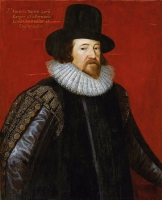| Francis Bacon | |
| 弗蘭西斯·培根 | |
|
閱讀培根 Francis Bacon, 1st Viscount St Alban在百家争鸣的作品!!! | |
弗蘭西斯·培根,第一代聖阿爾本子爵(Francis Bacon, 1st Viscount St Alban,1561年1月22日-1626年4月9日),著名英國哲學家、政治傢、科學家、法學家、演說傢和散文作傢,是古典經驗論的始祖。
生平
1561年1月22日,弗蘭西斯·培根出生於倫敦一個高級官員家庭。他的父親尼古拉·培根爵士(Sir Nicholas Bacon)擔任過伊麗莎白女王的大法官。培根是父親第二位妻子的最小的兒子。他的母親是文藝復興時代的一個博學多才的貴族婦女,其母的妹夫是伊麗莎白女王的重臣伯利勳爵。有了這種家庭背景和社會關係,再加上才華出衆,培根很早就有了出入宮廷的機會。早在孩提時代,他就被伊麗莎白女王稱為“我的小掌璽大臣”。
雄心勃勃的培根,很希望得到謀取功名利祿的終南捷徑。他十二歲入讀劍橋大學三一學院,攻讀神學、形而上學,同時學習邏輯、數學、天文學,希臘文和拉丁文。他對當時大學的教育體製和主宰學術研究的亞裏士多德哲學體係十分反感,1576年從劍橋大學畢業,他與英國駐法國大使一道,前往巴黎,他在那兒擔任英國駐法使館的外交事務秘書,並在巴黎學習統計學和外交。1579年因父病逝辭職回英國。1593年,他當選為下議院議員。1617年,詹姆斯一世赴蘇格蘭期間,出任掌璽大臣(Lord Keeper,或謂臨時攝政 Temporary Regent),1618年,他擔任詹姆斯一世手下的大法官(Lord Chancellor),並被授予維魯拉姆男爵的稱號,1621年晉爵為聖阿爾本子爵。
晚年因受賄案而被判有罪,國會指控培根身為大法官,卻接受當事人的禮物(當時英國政府不負責法院的費用,因此法官普遍收禮來支付法院的開支),當時國會正在攻擊國王在專利權發放的問題上圖利私人,培根因身為大法官而出審此案,但由於他與國王的同一陣綫,也遭到國會的指控與攻擊,培根為了保護國王,衹好全部認罪,培根被裁罰四萬英鎊的鉅款,罷免一切官位,從此一生不得擔任公職,並禁錮於倫敦塔,等候發落。罰款後來由國王支付。
得到了國王的赦免後,他唯有閉門著書,生活頗為凄涼,卻在學術上卓有成就,於一個寒冷的風雪中做用“白雪保存食物”(當時購買了一隻雞)實驗,而感染風寒,肺炎一病不起,終於喪命,卒於1626年4月9日。培根死後,亨利·沃登爵士為他題寫了墓志銘:
- 聖阿爾本子爵
- 如用更煊赫的頭銜應
- 稱之為“科學之光”、“法律之舌”
思想及其貢獻
培根是第一個意識到科學及其方法論的歷史意義以及它在人類生活中可能扮演的角色的人。他試圖通過分析和確定科學的一般方法和表明其應用方式,給予新科學運動以發展的動力和方向。
培根是一位哲學家。他一開始就探索實驗方法的各種可能性,他說他要做科學上的哥倫布。1605年他出版了第一本書《學術的進展》,這是解釋他的見解的最早的一部通俗讀物。
1620年,他主要的著作《學術的偉大復興》出版了一部分,這部書到他死時還沒有寫完。培根把此書分為六個部分。
- 導論,即《學術的進展》。
- 《新工具論》主要是對科學方法的分析,是書中最完整的部分。
- 原定是關於工匠學問和實驗事實的百科全書。
- 第四部分沒有找到,主要論述怎樣運用新方法來分析事實。
- 討論過去和現在的科學理論。
- 論述新自然哲學,把從各方面的事實提煉出來的假說和現有的科學理論最後加以綜合。
這部書培根衹寫到了第二部分。但是他對十七世紀英國和十八世紀法國影響都極大。在這部著作裏他提出了以觀察和實驗為基礎的科學認識理論,作為歸納法理論逐漸為人所知。
培根認為對自然的科學理解和技術控製是相輔相成,兩者都是運用科學方法的成果。培根對印刷、火藥和羅盤的發明非常重視。他以這三種發明為例,證明近代人比古希臘人的知識高明得多。培根說:
“因此促進科學和技術發展的新科學方法,首先要求的就是去尋找新的原理、新的操作程序和新的事實。這類原理和事實可在技術知識中找到,也可在實驗科學中找到。當我們理解了這些原理和知識以後,它們就會導致技術上和科學上的新應用。”
培根請求詹姆斯一世頒布命令去搜集各種方面的知識。他認為把大量事實搜集起來是他的方法的首要要求,衹要有一部篇幅六倍於老普林尼的《自然史》那樣的百科全書,他就可以解釋自然界的所有現象。
培根的科學方法觀是以實驗定性和歸納為主。他對科學方法上使用的數學和演繹法采取不信任態度。培根衹是在他提倡的方法上有他的獨創之見,但這些獨創之見也沒有立即得到應用。到十九世紀由於地質學和生物學中進化論的發展,培根的定性-歸納方法纔受到人們的重視。
在評價培根的方法論時,馬剋思曾說:
“科學是實驗的科學,科學的方法就在於用理性的方法去整理感性材料,歸納、分析、比較、觀察和實驗是理性方法和重要條件。”
在應用科學方面,培根感興趣的主要是工匠的技術和工業生産過程,因而他被稱作“工業科學的哲學家”。
培根還是一位散文傢。他在1624年出版的《論說文集》 the essays, 文筆非常優美,是值得一讀的佳作。其中有很多名句:
- 讀史使人明智,讀詩使人靈秀,數學使人周密,物理學使人深刻,倫理學使人莊重,邏輯修辭之學使人善辯;凡有所學,皆成性格。
- 真理是時間之産物,而不是權威之産物。
- 合理安排時間就是節約時間。
著作
參見
- 禁書目錄
- 散文(弗蘭西斯·培根)(Essays (Francis Bacon))
參考文獻
間接參考資料
 Fowler, Thomas. Bacon, Francis (1561-1626). (編) Stephen, Leslie. Dictionary of National Biography 2. London: Smith, Elder & Co: 328–60. 1885.
Fowler, Thomas. Bacon, Francis (1561-1626). (編) Stephen, Leslie. Dictionary of National Biography 2. London: Smith, Elder & Co: 328–60. 1885.
原始參考資料
- Bacon, Francis. The Essays and Counsels, Civil and Moral of Francis Bacon: all 3 volumes in a single file. B&R Samizdat Express, 2014.
- Andreae, Johann Valentin. Christianopolis. Description of the Republic of Christianopolis. 1619.
- Spedding, James; Ellis, Robert Leslie; Heath, Douglas Denon. The Works of Francis Bacon, Baron of Verulam, Viscount St Albans and Lord High Chancellor of England (15 volumes). London. 1857–1874.
其他來源:
 本條目出自公有領域:Adamson, Robert; Mitchell, John Malcolm. Bacon, Francis. (編) Chisholm, Hugh. 大英百科全書 3 (11th ed.). 劍橋大學出版社: 135–152. 1911.
本條目出自公有領域:Adamson, Robert; Mitchell, John Malcolm. Bacon, Francis. (編) Chisholm, Hugh. 大英百科全書 3 (11th ed.). 劍橋大學出版社: 135–152. 1911.
延伸閱讀
- Farrell, John. 6: The Science of Suspicion. Paranoia and Modernity: Cervantes to Rousseau. Cornell University Press. 2006. ISBN 978-0801474064.
- Farrington, Benjamin. The Philosophy of Francis Bacon. University of Chicago Press. 1964.Contains English translations of
- Temporis Partus Masculus
- Cogitata et Visa
- Redargutio Philosophiarum
- Heese, Mary. Francis Bacon's Philosophy of Science. (編) Vickers, Brian. Essential Articles for the Study of Francis Bacon. Hamden, CT: Archon Books. 1968: 114–39.
- Lewis, Rhodri. "Francis Bacon and Ingenuity." Renaissance Quarterly 67.1 (2014): 113–163. in JSTOR
- Roselle, Daniel; Young, Anne P. 5: The 'Scientific Revolution' and the 'Intellectual Revolution'. Our Western Heritage.[需要完整來源]
- Rossi, Paolo. Francis Bacon: from Magic to Science. Taylor & Francis. 1978.
- Serjeantson, Richard. "Francis Bacon and the 'Interpretation of Nature' in the Late Renaissance," Isis (Dec 2014) 105#4 pp: 681–705.
外部連接
- 與弗蘭西斯·培根相關的檔案. 英國國傢檔案館.
- Contains the New Organon, slightly modified for easier reading
- Lord Macaulay's essay Lord Bacon (Edinburgh Review, 1837)
- Francis Bacon of Verulam. Realistic Philosophy and its Age by Kuno Fischer, translated from the German by John Oxenford London 1857
- Bacon by Thomas Fowler (1881) public domain at Internet Archive
- The Francis Bacon Society
- English translation of Hugo von Hofmannsthal's fictional The Lord Chandos Letter, addressed to Bacon
- The George Fabyan Collection at the Library of Congress is rich in the works of Francis Bacon.
Francis Bacon, 1st Viscount St Alban,[a] Kt PC QC (/ˈbeɪkən/; 22 January 1561 – 9 April 1626), also known as Lord Verulam, was an English philosopher and statesman who served as Attorney General and as Lord Chancellor of England. His works are credited with developing the scientific method and remained influential through the scientific revolution.
Bacon has been called the father of empiricism. His works argued for the possibility of scientific knowledge based only upon inductive reasoning and careful observation of events in nature. Most importantly, he argued science could be achieved by use of a sceptical and methodical approach whereby scientists aim to avoid misleading themselves. Although his most specific proposals about such a method, the Baconian method, did not have a long-lasting influence, the general idea of the importance and possibility of a sceptical methodology makes Bacon the father of the scientific method. This method was a new rhetorical and theoretical framework for science, the practical details of which are still central in debates about science and methodology.
Francis Bacon was a patron of libraries and developed a functional system for the cataloguing of books by dividing them into three categories—history, poetry, and philosophy—which could further be divided into more specific subjects and subheadings. Bacon was educated at Trinity College, Cambridge, where he rigorously followed the medieval curriculum, largely in Latin.
Bacon was the first recipient of the Queen's counsel designation, which was conferred in 1597 when Elizabeth I of England reserved Bacon as her legal advisor. After the accession of James VI and I in 1603, Bacon was knighted. He was later created Baron Verulam in 1618 and Viscount St. Alban in 1621.[b]
Because he had no heirs, both titles became extinct upon his death in 1626, at 65 years. Bacon died of pneumonia, with one account by John Aubrey stating that he had contracted the condition while studying the effects of freezing on the preservation of meat. He is buried at St Michael's Church, St Albans, Hertfordshire.

